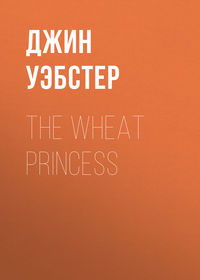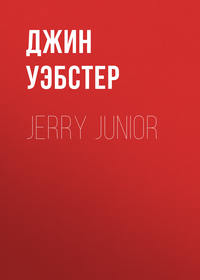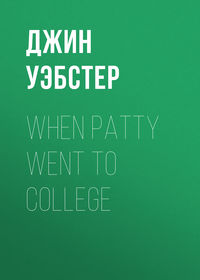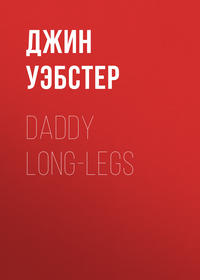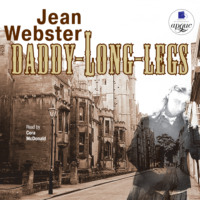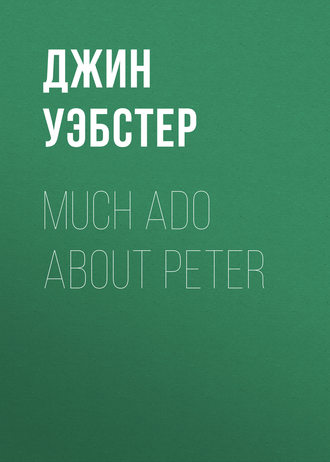 полная версия
полная версияMuch Ado About Peter
"Annie," she said, "you'll have to wash this dress. I forgot to have Kate do it yesterday, and I want to wear it to-night. Have it ready by five o'clock and be careful about the lace."
She threw the frock across the back of a chair, and ran on out of doors to join a laughing crowd of young people about the tennis-court. Annie stood in the middle of the floor and watched her with a fast-clouding brow.
"An' never so much as said please!" she muttered to herself. She walked over and picked up the frock. It was very elaborate with ruffles and tucks and lace insertion; its ironing meant a good two hours' work. Ironing muslin gowns on a Fourth of July was not Annie's business. She turned it about slowly and her eyes filled with tears—not of sorrow for the lost afternoon, but of anger at the injustice of demanding such work from her on such a day.
Presently Nora came in again. She paused in the doorway, her arms akimbo, and regarded Annie.
"What's that you've got?" she inquired.
Then the floodgates of Annie's wrath were opened and she poured out her tale.
"Don't you mind it, Annie darlin'," said Nora, trying to comfort her. "Miss Ethel didn't mean nothin'. She was in a hurry, likely, an' she didn't stop to think."
"Didn't think! Why can't she wear some other dress? She's got a whole room just full o' dresses, an' she has to have that special one ironed at a minute's notice. An' Kate comin' three days in the week! It isn't my place to wash—that isn't what Mrs. Carter engaged me for—I wouldn't 'a' minded so much if she'd asked it as a favour, but she just ordered me as if washin' was me work. On Fourth o' July, too, an' Mrs. Carter tellin' me I could have the afternoon off—an' all those ruffles—'have it done by five o'clock,' she says, an' goes out to play."
Annie threw the dress in a fluffy pile in the middle of the floor.
"I shan't do it! I won't be ordered about that way by Miss Ethel or anybody else."
"I'd do it for you meself, Annie, but I couldn't iron that waist no more 'n a kangaroo. But you just get to work on it; you iron beautiful and it won't take you long when you once begin."
"Won't take me long? It'll take me the whole afternoon; it'll take me forever. I shan't touch it!"
Annie's eyes wandered out of doors again. The sunshine seemed brighter, the songs of the birds louder, the glimpse of the bay more enticing. And, as she looked, Peter came sauntering out from the stables—Peter in his town clothes, freshly shaven, with a new red necktie and a flower in his buttonhole. He was coming toward the kitchen.
Annie's lips trembled and she kicked the dress spitefully.
Peter appeared in the doorway. He, too, had been revolving projects for the fitting celebration of the day, and he wished tentatively to broach them to Annie.
"What's up?" he inquired, looking from Annie's flushed cheeks to Nora's troubled eyes.
Annie repeated the story, growing more and more aggrieved as she dwelt upon her wrongs. "An' never so much as said please," she finished.
"That's nothin'—ye mustn't mind it, Annie. Miss Ethel ain't used to sayin' please." Peter was gropingly endeavouring to soothe her. "I remember times when she was a little girl she'd be so sassy, that, Lor', me fingers was itchin' to shake her! But I knowed she didn't mean nothin', so I just touches me hat an' swallows it. She's used to orderin', Annie, an' ye mustn't mind her."
"Well, I ain't used to takin' orders like that, an' what's more, I won't! 'Have it done by five o'clock,' she says, an' it's half past two, now. An' all them ruffles! I hate ruffles, an' I won't touch it after the way she talked. Not if she goes down on her knees to me, I won't."
"Aw, Annie," remonstrated Peter, "what's the use in kickin' up a fuss? Miss Ethel's awful kind hearted when she thinks about it."
"Kind hearted!" Annie sniffed. "I guess she can afford to be kind hearted, havin' people wait on her from mornin' to night an' never doin' a thing she doesn't want to do. I wish she had to iron once, an' she could just see how she likes it."
"She gave you a bran' new dress last week," reminded Nora.
"Yes, an' why? 'Cause when I was dustin' her room she happened to be tryin' it on an' it didn't fit, an' she threw it down on the floor an' said: 'I won't wear that thing! You can have it, Annie.'"
"The time you burned your hand with her chafing-dish she 'most cried when she saw how blistered it was, an' wrapped it up herself, an' brought you some stuff in a silver box to put on it."
For a moment Annie showed signs of relenting, but as her glance fell upon the dress again, she hardened. "She tipped the alcohol over me herself an' she'd ought to be sorry. I'd be willin' to do her a favour, but I won't be ordered around. She just pokes it at me as if I was an ironing machine. An' this the Fourth o' July, an' Mrs. Carter tellin' me I could go out. She has enough dresses to last from now till she's gray, an' I just won't touch it!"
"You won't touch what?" asked Mrs. Carter, appearing in the doorway. She glanced from the girl's angry face to the rumpled frock upon the floor. They told their own story. "What's the meaning of this, Annie?" she asked sharply.
Annie looked sulky. She stared at the floor a moment without answering, while Peter's and Nora's eyes anxiously scanned Mrs. Carter's face. Finally she replied:
"You said I could go out this afternoon, ma'am, an' just as I was gettin' ready, Miss Ethel came in an' said I was to wash that dress before five o'clock."
"I am sorry about your afternoon," said Mrs. Carter. "Miss Ethel didn't know about it, but you may go to-morrow afternoon instead."
"I was wantin' to go to-day," said Annie. "I'm willin' enough to do me own work, ma'am, but it isn't me place to wash."
Mrs. Carter's mouth became a straight line.
"Annie, I never allow my servants to dictate as to what is their work and what is not. When I engage you, I expect you to do whatever you are asked. This is a very easy place; you are allowed to go out a great deal, and you have very little work to do. But when something extra comes up outside your regular work, I expect you to do it willingly and as a matter of course. Miss Ethel has been very kind to you; you can do her a favour in return."
"I wouldn't mind doin' it as a favour, but she just walks in an' orders it as if it was me regular place to wash."
"And I order it also," said Mrs. Carter. "You may wash that dress and have it done by five o'clock, or else you may pack your trunk and go." She turned with a firm tread and walked out of the room.
Annie looked after her with flashing eyes.
"She orders it too, does she? Well, I won't do it, an' I won't, an' I won't!" She dropped down in a chair at one end of the table and hid her head in her arms.
Peter cast an anxious glance at Nora; he did not know how to deal with Annie's case. Had she been an obstinate stable-boy, he would have taken her out behind the barn and thrashed reason into her with a leather strap. He awkwardly laid his hand on her shoulder.
"Aw, Annie, wash the dress; there's a good girl. It won't take ye very long, an' then we'll go down t' the beach to-night to see the fireworks. Miss Ethel didn't mean nothin'. What's the use o' makin' trouble?"
"It's no more my place to wash than it is Simpkins's," she sobbed. "Why didn't she ask him to do it? I won't stay in a place like this where they order you around like a dog. I'll pack me trunk, I will."
Nora and Peter regarded each other helplessly. They furtively sympathized with Annie, but they did not dare to do it openly, as sympathy only fanned the flames, and they both knew that Mrs. Carter, having pronounced her ultimatum, would stand by it. Annie must wash that dress before five o'clock, or Annie must go. At the thought of her going, Peter fetched a deep sigh, and two frowning lines appeared on his brow. She had been there only four weeks, but Willowbrook would never again be Willowbrook without her. Presently the silence was broken by the sound of generous footsteps flapping across the back veranda, and Ellen, the cook at Mr. Jasper's, appeared in the doorway.
"Good afternoon to ye, Nora, an' I wants to borrow a drop o' vanilla. I ardered it two days ago, an' that fool of a grocer's b'y–what's the matter wit' Annie?" she asked, her good-natured laughing face taking on a look of concern as she gazed at the tableau before her.
Nora and Peter between them explained. Annie, meanwhile, paid no attention to the recital of her wrongs; only her heaving shoulders were eloquent. Ellen hearkened to the story with ready sympathy.
"Oh, it's a shame, it is, an' on Fort' o' July! We all has our troubles in this world." She sighed heavily and winked at Peter and Nora while she pushed them toward the door. "Get out wit' ye, the two of yez, an' lave her to me," she whispered.
Ellen reached down and picked up the dress. "'Tis somethin' awful the things people will be puttin' on ye, if ye give 'em the chance. 'Tis a shame to ask any human bein' to wash a dress like that wit' all them ruffles an' lace fixin's. I think it's bad enough to have to wash Mr. Harry's shirts, but if he took to havin' lace set in 'em, I'd be leavin' pretty quick. An' ye not trained to laundry work either! I don't see how Miss Ethel had the nerve to ask it. She must be awful over-reachin'. She'll be settin' ye to play the piano next for her to dance by."
Annie raised a tear-stained face.
"I could do it," she said sulkily. "I can wash as good as Kate; Miss Ethel said I could. It's not the work I'm mindin' if she'd ask me decent. But she just throws it at me with never so much as please."
"I don't blame ye for leavin'; I would, too." Ellen suddenly had an inspiration, and she plumped down in a chair at the opposite end of the table. "I'm goin' to leave meself!" she announced. "I won't be put upon either. An' what do ye think Mr. Jasper is after telephonin' out this afternoon? He's bringin' company to dinner—three strange min I niver set eyes on before—an' he's sint a fish home by Patrick, a blue fish he's after catchin'. It's in the ice-box now an' we're to have it for dinner, he says, an' I wit' me dinner all planned. I don't mind havin' soup, an' roast, an' salad, an' dessert, but I won't have soup, an' fish, an' roast, an' salad, an' dessert. If there was as many to do the work at our house as there is over here, I wouldn't say nothin', but wit' only me an' George—an' him not so much as touchin' a thing but the silver an' the glasses—it's too much, it is. George 'ud see me buried under a mountain o' dishes before he'd lift a finger to help."
Ellen paused with a pathetic snivel while she wiped her eyes on a corner of her apron. Annie raised her head and regarded her sympathetically.
"Soup, an' fish, an' roast, an' salad, an' dessert, an' three strange min into the bargain, an' all the dishes to wash, an' the fish not even cleaned. True it is that troubles niver come single; they're married an' has children. Ivery siparate scale o' that blue fish did I take off wit' me own hands, an' not a word o' thanks do I get. I slaves for those two min till me fingers is worn to the bone, an' not a sign do they give; but just let the meat be too done, or the bottles not cold, an' then I hears quick enough! 'Tis the way wit' min; they're an ungrateful set. Ye can work an' work till ye're like to drop, an' they swallows it all an' niver blinks. It ud be different if there was a woman around. I've often wished as Mr. Harry had a wife like Miss Ethel, so smilin' an' pretty 't is a pleasure to watch her. Oh, an' I wouldn't mind workin' a little extra now an' then for her—but five courses an' no one but me to do the dishes! It's goin' I am. I'll give notice to-night."
Ellen broke down and wept into her apron while Annie attempted some feeble consolation.
"I've worked there thirteen years!" Ellen sobbed. "Since before Mrs. Jasper died, when Mr. Harry was only a b'y. 'Tis the only home I've got, an' I don't want to leave."
"Then what makes you?" Annie asked.
"Because I won't be put upon—soup, an' fish, an' roast, an' salad, an' dessert is too much to ask of any human bein'. The dishes won't be done till ten o'clock, an' it's Fort' o' Ju-l-y-y." Ellen's voice trailed into a wail. Her imagination was vivid; by this time she fully believed in her wrongs. They cried in unison a few minutes, Ellen murmuring brokenly: "Soup, an' fish, an' roast, an' salad, an' dessert, an' it's all the home I've got.
"You don't have company very often," said Annie consolingly.
"That we don't!" cried Ellen. "An' the house is so lonesome an' shut up 'tis like a tomb to live in. If there was dancin' an' singin' an' laughin' the way there is over here I'd be glad enough. Wit' Mr. Jasper an' Mr. Harry so quiet an' frownin' an never sayin' a word—Oh, if I had someone like Miss Ethel to do for 'tis willin' enough I'd be to iron her dresses. That night she had her party an' I come over to help, an' you an' Pete was dancin' in the kitchen to the music, an' after the guests was served we had a table set out on the back veranda—'tis then I was wishin' I lived in a place like this. An' Miss Ethel come out when we was eatin' an' asked was we tired an' said thank you for sittin' up so late, an' she was glad if we was havin' a good time, too."
Annie sighed, and her eyes wandered somewhat guiltily to the dress on the floor.
"Mrs. Carter orders me around just as if I was a machine," she reiterated, in a tone of self-defence.
"An' it's orderin' around ye've got to learn to take in this world," said Ellen. "If ye occasionally get a 'thank ye,' thrown in, ye can think yourself lucky—it's more 'n I get. I've darned Mr. Harry's socks for eleven years, an' never a word o' notice does he take—I'm doubtin' he even knows they're darned. 'Tis a thankless world, Annie dear. Thirteen years I've worked for the Jaspers, an' on top o' that to ask me for soup, an' fish, an' roast, an' salad, an' dessert on a Fort' o' July night!"
Ellen showed signs of breaking down again and Annie hastily interposed.
"Don't cry about it, Ellen; it's too bad, it is, but Mr. Jasper likely didn't think what a lot o' trouble he was makin'. He ain't never washed no dishes an' he don't know what it's like. I'll come over an' help you do them."
"But ye won't be here. Ye're goin' yerself," Ellen blubbered.
Annie was silent.
"Thirteen years an' 'tis the only home I've got."
"Don't go, Ellen," Annie begged.
"Soup, an' fish, an' roast–"
"I'll stay if you will!"
Ellen heaved a final shuddering sigh and wiped her eyes.
"Ye'll have to hurry, Annie, if ye're goin' to get that dress done by five o'clock. Come on!" she cried, jumping to her feet. "I'll help ye. Ye take the waist and I'll take the skirt, an' we'll see which one gets done first. It just needs a little rubbin' out an' we'll iron it damp."
Five minutes later, Peter and Nora, who had been sitting on the back steps, waiting patiently for Ellen's diplomacy to bear fruit, returned to the laundry. They found Ellen at one tub and Annie at another—up to her elbows in the soap suds, her cheeks still flushed, but a smile beginning to break through.
"Ellen's helpin' me," she said in rather sheepish explanation.
"An' she's comin' over to wash the dishes for me to-night," Ellen chimed in. "We're havin' soup, an' fish, an' roast, an'–"
Peter clapped his hand over his mouth and Nora cast him a warning look.
"You're goin' to the beach with Pete to see the fireworks, that's where you're goin' to-night," she said. "I'll help Ellen with her dishes."
"Thank ye, Nora," said Ellen. "'Tis a kind heart ye've got, an' that's more 'n I can say for Mr. Jasper, for all I've worked for 'im thirteen years. 'Tis soup, an' fish, an' roast, an' salad, an' dessert the man's after wantin' for dinner to-night, an' no one but me to wash a kettle. If it wasn't for Annie, I'd be leavin', I would." Ellen wrung the skirt out and splashed it up and down in the rinsing water. "An' now while this dress is dryin' ready to iron, I'll just run home an' stir up a bit o' puddin' for dessert, if ye'll be lendin' me some vanilla, Nora dear. That fool of a grocery b'y–"
"Oh, take your vanilla an' get along wit' you! We've had all we wants o' your soup an' your fish an' the rest o' your fixin's."
Nora dived into the pantry after the bottle, while the attention of the others was attracted by a gay laugh outside the window. Annie's face clouded at the sound, and they all looked out.
Miss Ethel was coming across the lawn on her way to the bay. Mr. Lane, who was visiting at Willowbrook, strolled at her side, dressed in white boating flannels with some oars over his shoulder. A little way behind walked Mr. Harry, a second pair of oars over his shoulder, and his eyes somewhat surlily bent on the ground. Miss Ethel, pretty and smiling in her light summer gown, was talking vivaciously to Mr. Lane, apparently having forgotten that Mr. Harry existed.
"I'd show her pretty quick if I was Mr. Harry!" Ellen muttered vindictively.
Miss Ethel paused and shaded her eyes with her hand.
"It's awfully sunny!" she complained. "I'm afraid I want a hat." She glanced back over her shoulder. "Harry," she called, "run back and get my hat. I think I left it on the front veranda, or maybe at the tennis-court. We'll wait for you at the landing."
For a moment Mr. Harry looked black at this peremptory dismissal; but he bowed politely, and whirling about strode back to the house while Miss Ethel and Mr. Lane went on laughing down the hill.
"An' she never so much as said please!" whispered Annie.
"I'll be darned if I'd do it," said Peter.
III
THEIR INNOCENT DIVERSIONS
"We got three kids visitin' to our house, and there won't be nothin' left o' Willowbrook by the time they goes away. Hold up, Trixy! What are ye tryin' to do?"
Peter paused to hook the line out from under Trixy's tail, and then re-cocking his hat at a comfortable angle and crossing his legs, he settled himself for conversation. Peter loved to talk and he loved an audience; he was essentially a social animal. His listeners were two brother coachmen and a bandy-legged young groom, who were waiting, like himself, for "ladies' morning" to draw to its usual placid termination—sandwiches and lemonade on the club veranda after a not too heated putting contest on the first green.
"Yes, we got three visitin' kids; with Master Bobby it makes four, and I ain't drawed an easy breath since the mornin' they arrived. They keep up such an everlastin' racket that the people in the house can't stand them, an' we've had them in the stables most o' the time. Mrs. Brainard, that's their mother, is Mr. Carter's sister, and I can tell ye she makes herself to home.
"That's her over there with the lavender dress and the parasol"—he jerked his head in the direction of a gaily dressed group of ladies trailing across the links in the direction of the first green. "She's mournin' for her husband—light mournin', that is; he's dead two years."
"She picked me the first day to look after the la-ads. 'Peter,' she says, 'me dear boys are cr-razy to play in the stables, but I can't help worryin' for fear they'll get under the horses' feet. I have perfect confidence in you,' she says, 'and I'll put them under yer special care. Just keep yer eye on the la-ads an' see that they don't get hur-rt.'
"'Thank ye, ma'am,' says I, flattered by the attention, I'll do the best I can.' I hadn't made the acquaintance o' the little darlin's yet, or I would 'a' chucked me job on the spot.
"Master Augustus—he's the youngest—has gold curls an' blue eyes and a smile as innocint as honey. He's the kind the ladies stops an' kisses, and asks, 'Whose little boy is you?' At the first glance ye'd think to see a couple o' wings sproutin' out behind, but when ye knowed him intimately, ye'd look for the horns an' tail. I've pulled that little divvil three times out o' the duck pond, and I've fished him out from the grain chute with a boat hook. I couldn't tell ye the number o' trees he's climbed after birds' eggs and got stuck in the top of; we keeps a groom an' ladder on tap, so to speak. One afternoon I caught the four o' them smokin' cigarettes made o' dried corn silk up in the hay loft as comfortable as ye please—'tis many a stable-boy as has been bounced for less. Between them they finished up the dope the vet'rinary surgeon left when Blue Gipsy had the heaves, thinkin' it was whisky—an' serves them right, I say. I didn't tell on 'em, though, when the doctor asked what I thought the trouble was; I said I guessed it was green apples.
"But them's only the minor divarsions that occupy their leisure; they're nothin' to the things they think of when they really get down to business. The first thing they done was to pretend the victoria was a pirate ship; an' they scratched the paint all up a-tryin' to board her. Joe turned 'em out o' doors to play, an' they dug up the whole o' the strawberry bed huntin' for hidden treasure. Their next move was to take off their shoes an' stockin's, turn their clothes wrong side out, an' dirty up their faces with huckleberry juice—ye would have sworn they was a lot o' jabberin' Dagoes. They went beggin' in all the houses o' the neighbourhood, includin' Willowbrook, an' Nora never knew them an' give them some cold potatoes.
"One day last week they nearly broke their blame young necks slidin' down the waggon-shed roof on a greased tea-tray. There's a pile o' straw at the bottom that kind of acted as a buffer, but Master Augustus didn't steer straight an' went over the edge. 'Twas only a drop o' four feet, but he come up lookin' damaged.
"That ain't the worst though. Last Sunday afternoon they frightened the cow into hysterics playin' she was a bull, an' they was matydoors or torydoors, or whatever ye call them. They stuck pins into her with paper windmills on the end, and she ain't give more 'n six quarts at any milkin' since. I was mad, I was, an' I marched 'em to the house an' tole their mother.
"'It grieves me,' she says, 'to think that me boys should be so troublesome; but they didn't mean to be cruel to the poor dumb brute. They're spirited la-ads,' she says, 'an' their imaginations run away wid them. What they needs is intilligent direction. Ye should try,' she says, 'to enter into the spirit o' their innocint divarsions; an' when ye see them doin' somethin' dangerous, gintly turn their thoughts into another channel. Their grattytood,' she says, 'will pay ye for yer trouble.'
"'Wery well, ma'am,' says I, not too enthusiastic, 'I'll do the best I can,' and I bows meself out. I've been superintendin' their innocint divarsions ever since, and if there's any one as wants the job, I'll turn it over to him quick."
Peter paused to back his horses farther into the shade; then having climbed down and taken a drink at a near-by hydrant, he resumed his seat and the conversation.
"But ye should have seen them this mornin' when I drove off! They was a sight if there ever was one. Joe's away with Mr. Carter and I'm takin' charge for the day. When I went into the carriage-house to give Billy orders about hitchin' up, what should I find but them precious little lambkins gambolin' around in stri-ped bathin' trunks, an' not another stitch. They was further engaged in paintin' their skins where the trunks left off—an' that was the most o' them—with a copper colour foundation and a trimmin' o' black stripes.
"'Holy Saint Patrick!' says I. 'What the divvil are ye up to now?'
"'Whoop!' says Master Bobby. 'We'll scalp ye and eat yer heart. We're Comanche braves,' he says, 'an' we're gettin' ready for the war-path.'
"'Ye look more like zebras,' says I, 'escaped from a menagerie.'
"'Wait till we get our feathers on,' he says, 'an' Pete,' he adds, 'will you do me back? There's a place in the middle that I can't reach.'
"Wid that he turns a pink an' white surface a yawnin' for decoration, an' presses a can o' axle grease in me hands. And I'll be darned if them young imps hadn't covered their skins with axle grease and red brass polish, an' for variety, a touch o' bluing they'd got off Nora in the kitchen. An' they smelt—Gee! they smelt like a triple extract harness shop. I tole them I thought they'd be havin' trouble when they was ready to return to the haunts o' the pale-face; but Master Bobby said their clothes would cover it up.


